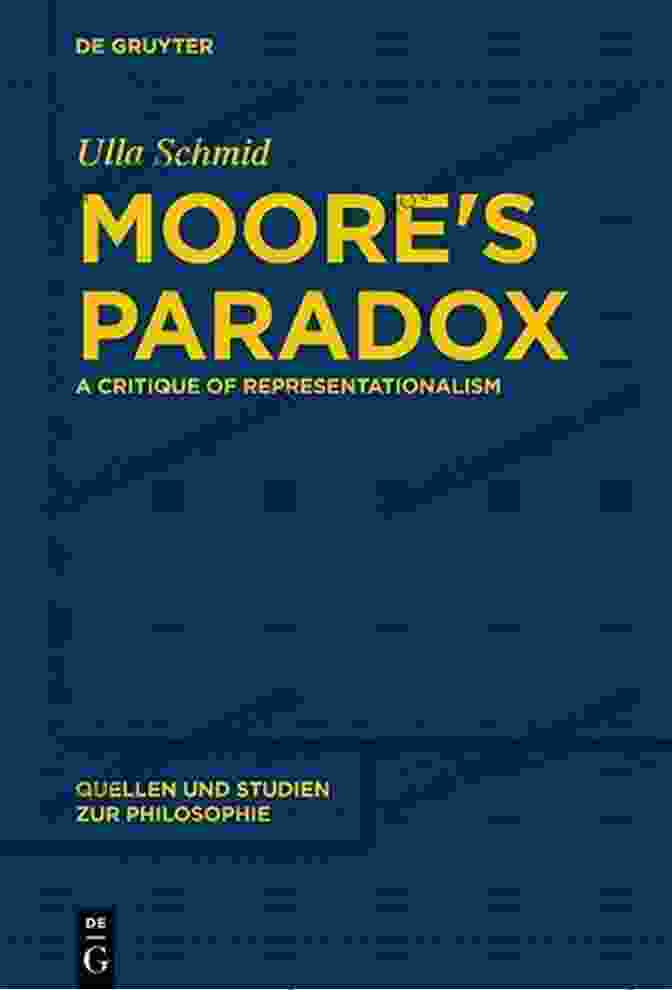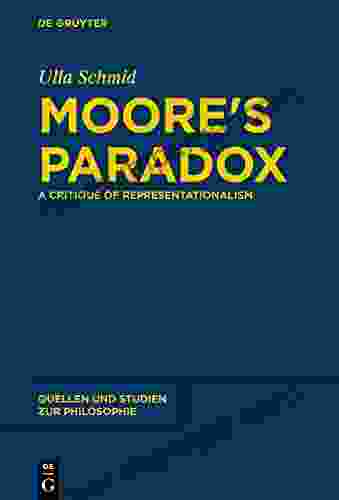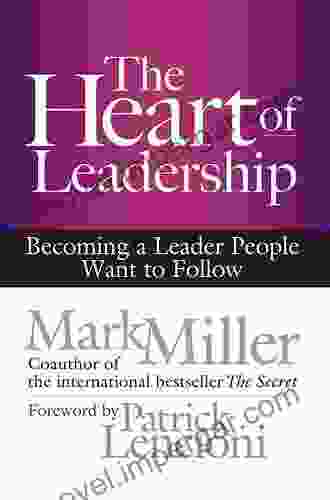Critique of Representationalism: A Philosophical Inquiry

In the vast tapestry of philosophical thought, the question of representation has been a persistent and profound one. How do we understand the relationship between our thoughts, perceptions, and the world around us? Are our experiences faithful representations of an objective reality, or are they subjective constructions filtered through our own cognitive biases? These are the fundamental questions that lie at the heart of representationalism, a philosophical theory that has sparked centuries of debate.
5 out of 5
| Language | : | English |
| File size | : | 1025 KB |
| Text-to-Speech | : | Enabled |
| Screen Reader | : | Supported |
| Enhanced typesetting | : | Enabled |
| Word Wise | : | Enabled |
| Print length | : | 295 pages |
In his groundbreaking work, Critique of Representationalism: Quellen und Studien zur Philosophie 124, Dr. Mark Wilson offers a comprehensive and rigorous examination of this complex philosophical concept. Drawing upon insights from both classical and contemporary philosophy, Wilson argues that representationalism is ultimately an untenable position, presenting a compelling case for an alternative philosophical framework.
The Central Tenets of Representationalism
At its core, representationalism posits that our minds are essentially representational systems. When we perceive an object, such as a tree or a book, our senses gather information that is then converted into a mental representation of that object. These representations are believed to be faithful reproductions of the external world, mirroring the objective properties and qualities of the things they represent.
This representationalist view has been widely held throughout the history of philosophy, from Plato's theory of Forms to Descartes's belief in clear and distinct ideas. However, Wilson argues that there are a number of fundamental problems with this theory that call its validity into question.
The Challenges to Representationalism
One of the primary challenges to representationalism is the issue of subjectivity. If our minds are merely representational systems, how do we account for the vast differences in our subjective experiences? Different people perceive the same object in vastly different ways, influenced by their own unique perspectives, cultural backgrounds, and personal biases.
Wilson argues that these subjective variations cannot be fully explained by representationalism. Instead, he suggests that our experiences are not merely representations of an external world but are actively constructed by our minds through a process of interpretation and meaning-making.
Another significant challenge to representationalism is the problem of intentionality. Intentionality refers to the ability of our minds to direct themselves towards objects and events in the world. We can think about, talk about, and interact with things that are not physically present to us. How is this possible if our minds are simply representational systems?
Wilson argues that intentionality cannot be reduced to mere representation. Instead, he proposes that it is a fundamental feature of human consciousness, allowing us to engage with the world in a meaningful and purposeful way.
An Alternative to Representationalism: Enactivism
Having presented a compelling critique of representationalism, Wilson goes on to propose an alternative philosophical framework known as enactivism. Enactivism emphasizes the active role of the body and environment in the construction of our cognitive experiences. Instead of viewing the mind as a passive receiver of information, enactivism sees it as an active participant in the process of meaning-making.
According to enactivism, our minds and the world are not separate entities but are mutually constitutive. Our cognitive experiences are shaped by our interactions with the environment, and the environment, in turn, is shaped by our cognitive interpretations. This dynamic relationship between mind and world is at the heart of enactivism.
Wilson argues that enactivism provides a more coherent and comprehensive account of human cognition than representationalism. It allows us to explain the subjectivity of experience, the intentionality of consciousness, and the dynamic interplay between mind and world.
In Critique of Representationalism, Dr. Mark Wilson offers a profound and insightful examination of one of the most fundamental questions in philosophy: How do we understand the relationship between our minds and the world? Through rigorous argumentation and a deep understanding of both classical and contemporary philosophical thought, Wilson challenges the traditional representationalist view and proposes an alternative framework that offers a more nuanced and compelling account of human cognition.
Critique of Representationalism is an essential read for anyone interested in the foundations of philosophy, the nature of mind and reality, and the ongoing quest to understand our place in the universe.

Critique of Representationalism by Dr. Mark Wilson
Free Download your copy today at Our Book Library!
5 out of 5
| Language | : | English |
| File size | : | 1025 KB |
| Text-to-Speech | : | Enabled |
| Screen Reader | : | Supported |
| Enhanced typesetting | : | Enabled |
| Word Wise | : | Enabled |
| Print length | : | 295 pages |
Do you want to contribute by writing guest posts on this blog?
Please contact us and send us a resume of previous articles that you have written.
 Book
Book Novel
Novel Page
Page Chapter
Chapter Text
Text Story
Story Genre
Genre Reader
Reader Library
Library Paperback
Paperback E-book
E-book Magazine
Magazine Newspaper
Newspaper Paragraph
Paragraph Sentence
Sentence Bookmark
Bookmark Shelf
Shelf Glossary
Glossary Bibliography
Bibliography Foreword
Foreword Preface
Preface Synopsis
Synopsis Annotation
Annotation Footnote
Footnote Manuscript
Manuscript Scroll
Scroll Codex
Codex Tome
Tome Bestseller
Bestseller Classics
Classics Library card
Library card Narrative
Narrative Biography
Biography Autobiography
Autobiography Memoir
Memoir Reference
Reference Encyclopedia
Encyclopedia Yi Li
Yi Li Yasmin Akhtar
Yasmin Akhtar Sean Covey
Sean Covey Yang Hu
Yang Hu Stan Phelps
Stan Phelps Richard Rubin
Richard Rubin Sarah Dunford
Sarah Dunford Sonjia Rush
Sonjia Rush Samuel Sharpe
Samuel Sharpe Wendy Wood
Wendy Wood Rose Hall
Rose Hall William Neill
William Neill Yehuda Nini
Yehuda Nini Rod Beverley
Rod Beverley Roger B Mcdonald
Roger B Mcdonald Sarah Kozloff
Sarah Kozloff Vincent R Johnson
Vincent R Johnson S V Gupta
S V Gupta Zachary Levenson
Zachary Levenson Adrienne Robillard
Adrienne Robillard
Light bulbAdvertise smarter! Our strategic ad space ensures maximum exposure. Reserve your spot today!
 Barry BryantFollow ·3.8k
Barry BryantFollow ·3.8k Adrien BlairFollow ·5.9k
Adrien BlairFollow ·5.9k Russell MitchellFollow ·11k
Russell MitchellFollow ·11k Jarrett BlairFollow ·17.1k
Jarrett BlairFollow ·17.1k Jack ButlerFollow ·10.1k
Jack ButlerFollow ·10.1k Herb SimmonsFollow ·12.9k
Herb SimmonsFollow ·12.9k Elmer PowellFollow ·15.3k
Elmer PowellFollow ·15.3k Branden SimmonsFollow ·2.5k
Branden SimmonsFollow ·2.5k

 Colt Simmons
Colt SimmonsLarge Collieries Iron Mines Stone Iron And Tinplate...
Step back in time and witness...

 Zachary Cox
Zachary CoxUnlocking the Secrets of Woody Plants: An In-Depth...
: Embark on a captivating journey into the...

 Yasunari Kawabata
Yasunari KawabataIntroducing 'Librarian Guide: 3rd Edition' – The Ultimate...
In the dynamic and ever-evolving...

 Jerome Blair
Jerome BlairEvading Honesty: A Masterful Exploration of Deceit and...
Prepare to be captivated...

 Timothy Ward
Timothy WardLove Is Real: A Novel of Love, Loss, and the Enduring...
Prepare to embark on a...
5 out of 5
| Language | : | English |
| File size | : | 1025 KB |
| Text-to-Speech | : | Enabled |
| Screen Reader | : | Supported |
| Enhanced typesetting | : | Enabled |
| Word Wise | : | Enabled |
| Print length | : | 295 pages |













